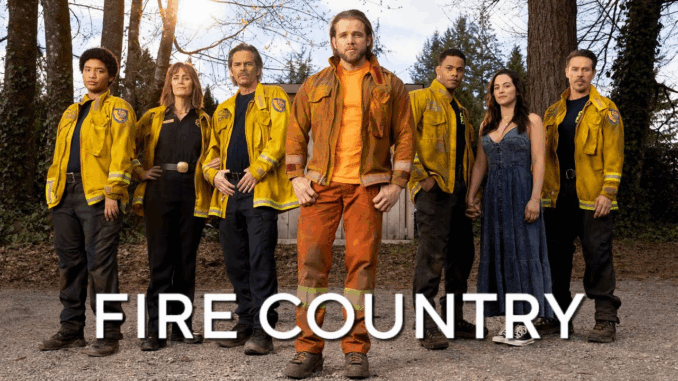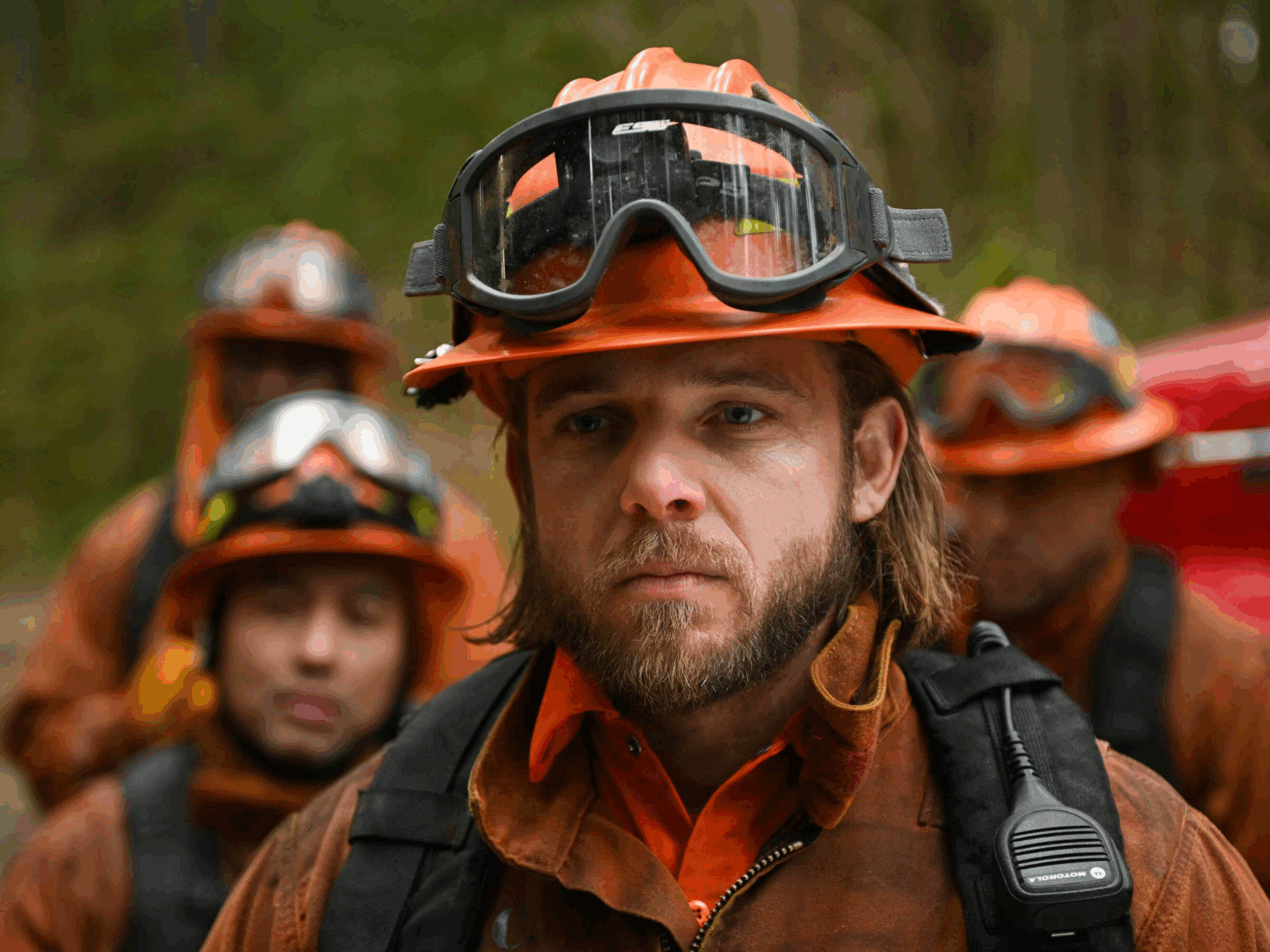
A Concept Rooted in Real-Life Fire and Redemption
When Fire Country premiered on CBS in October 2022, it arrived with more than the typical flare of a network drama. Created by Max Thieriot, Tony Phelan, and Joan Rater, the series wasn’t just about firefighting—it was about second chances, personal demons, and the emotional heat that burns within families long after the flames have gone out.
Set against the backdrop of Northern California’s wildfire country, the show centers on Bode Donovan (played by Thieriot), a former inmate who joins a firefighting program for convicts. As he works to redeem himself through service, Bode is stationed near his hometown—where old wounds, broken relationships, and buried truths threaten to reignite at every turn.
The premise was bold: a procedural that blended high-stakes fire rescues with raw, character-driven drama, and a strong emphasis on rural community dynamics, family loyalty, and redemption through labor. It wasn’t just about putting out fires. It was about the ones burning inside.
Bode Donovan: A Flawed, Human Hero
Unlike many traditional TV heroes, Bode Donovan is messy, broken, and real. He’s not a perfect firefighter. He’s a man in pain—haunted by past mistakes, unresolved guilt, and strained relationships, particularly with his parents Sharon and Vince Leone.
What makes Bode compelling is that he’s not asking to be liked. He’s asking for a second chance. Viewers see him struggle not just to earn trust from others, but to believe he deserves it. He wrestles with addiction, grief, anger, and the relentless pressure to prove that he’s more than his worst day.
Max Thieriot, who also executive produces the show, brings a deep emotional weight to the character, drawn in part from his own rural upbringing. His portrayal grounds the show in something personal and tangible—and that authenticity resonates with audiences.
A Spotlight on Real Firefighters and Inmate Fire Camps
One of Fire Country’s most notable features is its portrayal of California’s real-life Conservation Camp Program. Inmates in this program are trained to fight wildfires alongside professional Cal Fire crews. It’s a controversial but fascinating system that the show brings into public consciousness—something rarely depicted in popular media.
While dramatized for television, the show honors the bravery and sacrifice of both the incarcerated and professional firefighters. It humanizes the inmates, showing them not simply as criminals, but as people with trauma, dreams, and the capacity for growth.
This focus on a real-world institution gives Fire Country a unique edge. It doesn’t just invent stakes—it reflects them. Every fire in the series isn’t just a physical threat; it’s symbolic of the characters’ internal battles.
The Leone Family: The Emotional Core

At the heart of the show lies the Leone family, whose tangled web of love, resentment, and grief drives much of the show’s emotional power. Sharon Leone (Diane Farr), the tough, compassionate fire chief, and Vince Leone (Billy Burke), the principled battalion leader, are not just Bode’s parents—they’re key figures in the broader moral universe of the show.
Their relationship with Bode is strained but layered, and every scene between them is laced with history. Whether they’re confronting Bode’s past crimes or working side-by-side on a fireline, the emotional complexity of the family dynamics elevates the series beyond simple firefighting drama.
In Season 3, Vince’s death marked a devastating turning point. With him gone and Sharon battling both grief and health complications, the Leone family’s story enters a darker, more introspective chapter in Season 4.
Cal Fire as a Community, Not Just a Backdrop
Fire Country does something many procedurals fail to do: it treats the workplace not just as a setting, but as a living, breathing community. Each firefighter, inmate, paramedic, and supervisor carries their own story. Characters like Eve Edwards (Jules Latimer), Manny Perez (Kevin Alejandro), and Gabriela Perez (Stephanie Arcila) are given emotional weight and personal arcs.
Whether it’s Eve’s internal conflict over survivor’s guilt, Gabriela’s struggle for identity outside her romantic entanglements, or Manny’s redemption after his fall from grace, the show invests in character-driven subplots that connect deeply with its audience.
These secondary arcs help shape the world of Edgewater and reinforce the show’s central themes: redemption, loyalty, and the long road back from shame.
Themes That Resonate: Redemption, Guilt, and Healing
At its core, Fire Country isn’t just about fire. It’s about the human condition. Each episode explores how people confront their past, face their guilt, and seek healing—whether they find it or not. The fire becomes a metaphor for the chaos inside the characters: uncontrolled, destructive, but potentially cleansing.
The show doesn’t offer easy answers. People don’t always forgive. Not every rescue is a success. Characters make bad choices. But the message remains consistent: you are more than your worst mistake, and healing is possible—even if it comes through pain.
Critical and Fan Reception
Though some early critics labeled the show as melodramatic, Fire Country quickly gained a strong fan base. Viewers responded not just to the action, but to the rawness of the emotional storytelling. Ratings have remained strong, especially among the 18–49 demographic, and the show’s mix of character drama and life-or-death intensity proved a winning formula.
The series was renewed for Season 4 early, and discussions about a potential spinoff (Sheriff Country) reflect CBS’s confidence in the franchise’s staying power. But fans remain most attached to Fire Country’s beating heart: Bode’s journey, the Leone family, and the emotional integrity of the Edgewater crew.
What Season 4 Promises
As the series enters its fourth season, the stakes have never been higher. Vince’s death leaves a leadership void. Sharon is emotionally adrift. Bode faces an identity crisis. Gabriela is gone. The firelines are hotter, both literally and emotionally.
Insiders suggest that Season 4 will test every major character, with new recruits, deeper family revelations, and higher risks in the field. With its foundations firmly built on character and consequence, the show is poised to evolve—not just into a firefighting drama, but into a story about legacy, loss, and rebirth.
Conclusion: More Than a Procedural, A Story About People on Fire
Fire Country has proven that network television can still deliver powerful, personal, and high-stakes storytelling. By blending intense action with emotional honesty, the series has carved out a space that’s both entertaining and deeply moving.
Whether you’re drawn to the thrill of wildland firefighting or the quiet ache of a mother trying to save her son, Fire Country gives you a reason to care, week after week.
And with Season 4 set to be its most emotionally explosive chapter yet, it’s clear that the fire still burns strong—not just in the forests of California, but in the hearts of everyone in Edgewater.
